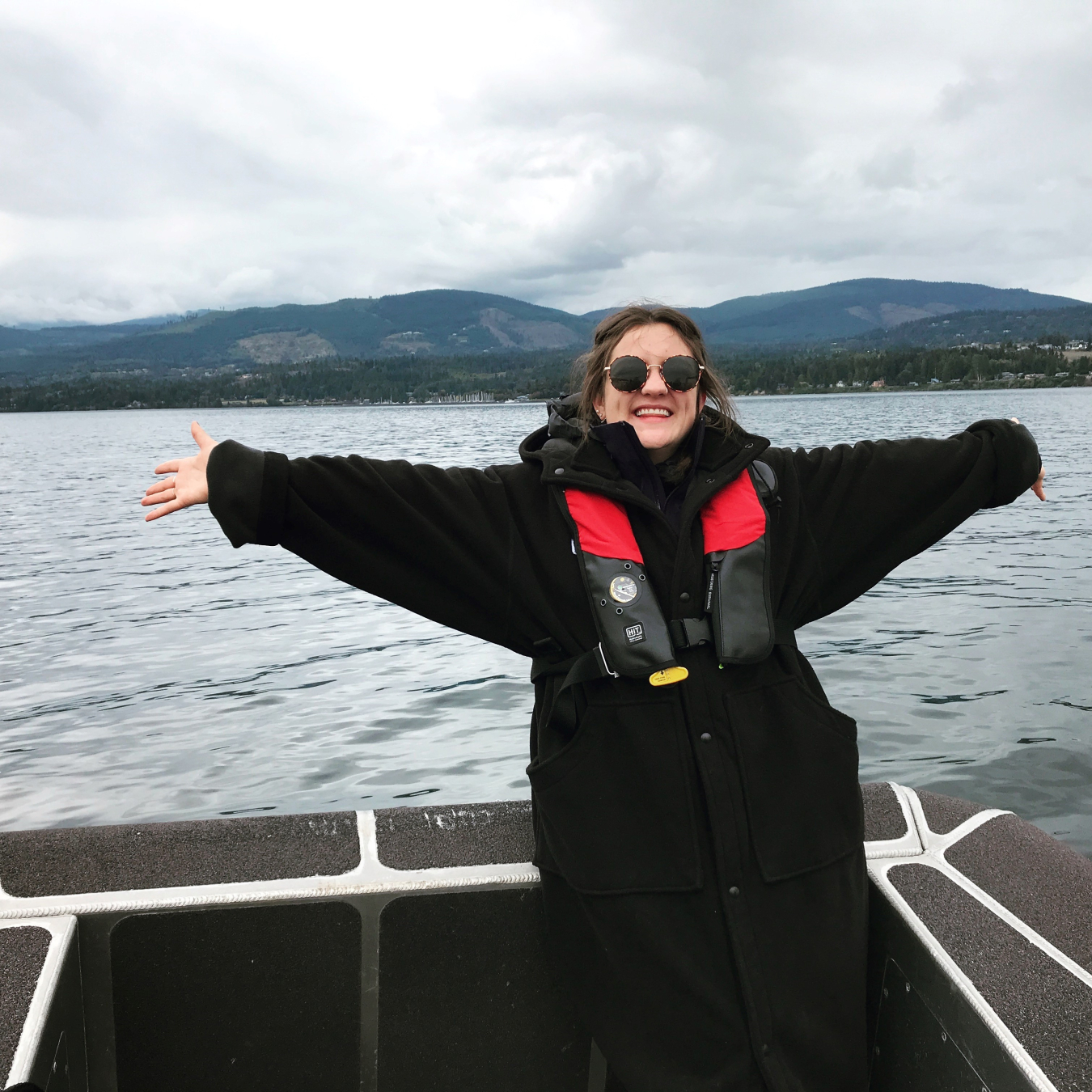Learn why Carrie Schmaus loves her job as an ORISE Science, Technology, and Policy Fellow at the Water Power Technologies Office (WPTO).
June 29, 2020June is Ocean Month, and to celebrate STEM Rising is sharing profiles of Energy Department staff in ocean-related careers. Meet Carrie Schmaus.
Carrie Schmaus is an ORISE Science, Technology, and Policy Fellow at the Water Power Technologies Office (WPTO) at the U.S. Department of Energy (DOE) and a 2018 Young Professional Leader in the International Electrotechnical Commission (IEC). Before spending a year with WPTO as a NOAA Knauss Marine Science and Policy Fellow in 2018, she worked as a research fellow at the National Council for Public-Private Partnerships, a DC-based non-profit that supports successful public-private partnership models. She graduated with her master’s from the School of Marine and Environmental Affairs at the University of Washington after graduating Phi Beta Kappa from Wittenberg University with a BS in biology and a minor in marine science.

What’s your favorite fact about the ocean?
One of the things I think is so fascinating about the ocean is how interconnected our society – and the health of our society – is with how the ocean changes, and vice versa: how we change the ocean. For example, the ocean plays a huge role in climate regulation, and has absorbed around 30% of the carbon dioxide we have released by burning fossil fuels. Unfortunately, this also causes ocean acidification, which is extremely dangerous for shellfish and coral, among other organisms, and could eventually lead to reduced availability of oysters (which is something else I love that comes from the ocean!)
What do you do to celebrate Ocean Month?
Usually, I would try to spend some time near or in the ocean, but this year I’m going to focus on ways to experience the ocean from home. One way to do that is to read – my favorite book is called Tides: The Science and Spirit of the Ocean, by Jonathan White. I’m also excited for the release of All We Can Save: Truth, Courage, and Solutions for the Climate Crisis, a book curated by Ayana Elizabeth Johnson and others. It’s scheduled to be released in September.
What inspired you to work in water power?
Marine renewable energy combines two of my passions of the ocean and renewable energy, so it was an easy decision to spend my Knauss Fellowship year with WPTO! Since my first day with the office – I’ve now been here about two and half years! – I’ve also discovered many other passions that I hope to pursue throughout my career, like early-stage technology development, entrepreneur support mechanisms, innovation ecosystem building, and work with international partners, especially through standards and conformity assessment. Because working with the ocean is inherently interdisciplinary, I’ve had the wonderful opportunity to work with a wide variety of projects and people, all while contributing to the greater good through public service. It’s been an incredibly rewarding experience.
What do you do in your job?
Most of my job is focused on the Powering the Blue Economy Initiative, which is the project that explores non-grid opportunities for marine energy, like powering desalination and ocean observing devices (we recently won the Assistant Secretary’s Annual Outstanding Achievement award!) The Initiative has two main portfolios: Resilient Coastal Communities, which focuses on near-shore applications of marine energy, and Power at Sea, which focuses on offshore applications of marine energy. In my role as lead for Power at Sea, I help implement the Ocean Observing Prize, which challenges competitors to integrate marine renewable energy with ocean observing devices. One of my favorite parts of this project is our partnership with the NOAA-led Integrated Ocean Observing System (IOOS), which I helped initiate. It’s exciting to be involved in a project that could help meet multiple agency missions and revolutionize how we collect information about the ocean!
What books or movies about the ocean do you recommend?
There are tons of incredible resources about the ocean! For general interest, I recommend the Blue Planet series or even Finding Nemo – the reef biology is pretty accurate (but PLEASE, don’t flush your fish and think they’ll get to the ocean!). For specific ocean issues, one of the most eye-opening documentaries for me was Sonic Sea, which addresses ocean noise. On my to-watch list is also Chasing Coral, which I’ve heard is really informative. And, like I mentioned above, one of my favorite books is Tides: The Science and Spirit of the Ocean by Johnathan White, and I love anything with Ayana Elizabeth Johnson!
Just like the ocean is vast, so is the world of opportunities to work with the ocean! I think the best way to figure out what to do for you career is to think deeply about your passion – is it the feeding habits of nudibranchs? Regulation of finfish aquaculture? Sustainability of the marine transportation sector? – and find a way to work within your topic of interest. There are ocean opportunities in every sector and at every level, from local communities to international fishing enterprises, as well as opportunities for almost every discipline, from scientist to communication experts to architects… so discover what you’re passionate about and find a way to get involved!
For more Ocean Month profiles and STEM resources, visit www.energy.gov/STEM

